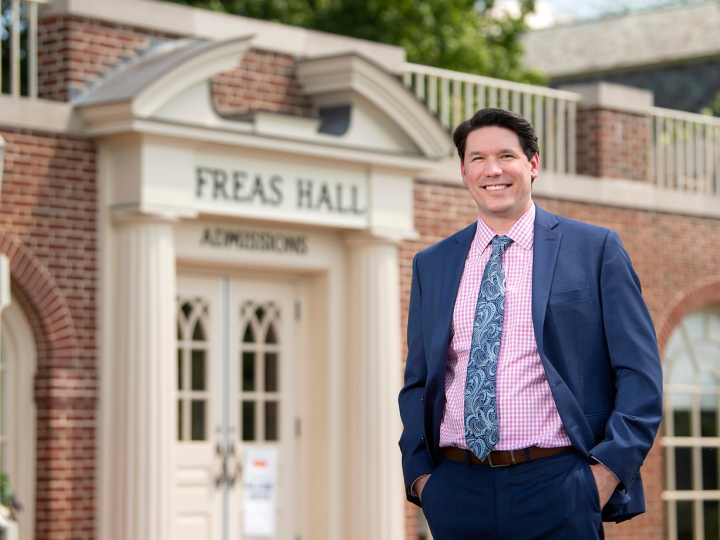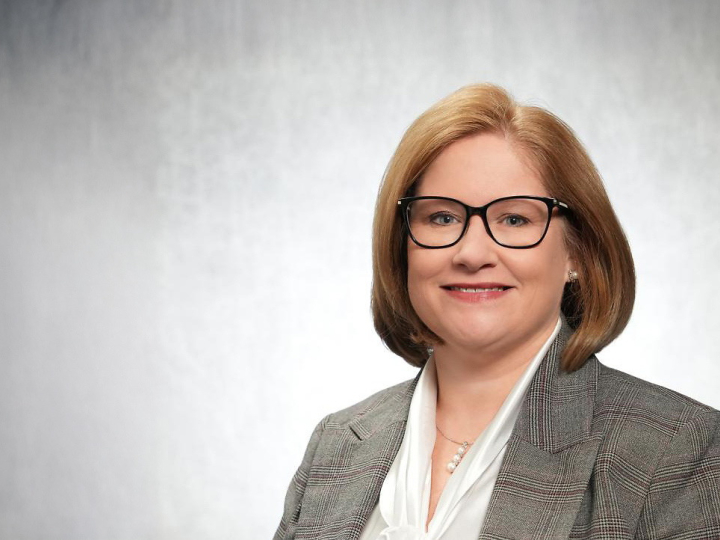
Food, Friends and Fulfillment: On-Campus Farm Provides Transformative Opportunities for Bucknellians
December 3, 2021
Bitseat Getaneh ’22 is one of many students pursuing hands-on education in one of Bucknell’s most dynamic living laboratories. Photo by Emily Paine, Communications
On Sam Pring '23's first visit to the Bucknell Farm, biology professor and farm adviser Mark Spiro plucked a ripe cob of corn off the stalk and grilled it up on the spot. It was one of Pring's earliest experiences at Bucknell during first-year Orientation and "made a really good first impression to have a professor make us fresh food," Pring says.
Pring's interest in the farm would only grow as a participant in the Environmental Residential College, which engages first-year students in the planet's most pressing sustainability and climate issues through immersive experiences in nature. Now, the biology and linguistics double-major is just one of many students pursuing hands-on education in one of Bucknell's most dynamic living laboratories.
Established in 2018, the University's 5-acre plot on South Campus is the ultimate space for environmental exploration and community engagement, with plentiful rows of organic fruits and vegetables hand-grown by students, faculty and staff. In addition to producing sustainable food for Bucknell's on-campus dining spaces and local community harvest programs, the farm provides an interdisciplinary outdoor learning environment for dozens of courses. Its features include a pollinator habitat, a meditation labyrinth and a fire pit for gathering.
"It's an awesome opportunity to spend time outside, move around and even do scientific work that benefits the community around us," says Pring, who has used the site as a setting for biological research.

Sam Pring '23 is partnering with peers to analyze the effects of regenerative agriculture practices on the farm's soil health. Photo by Emily Paine, Communications
Pring's first project, overseen by Spiro as part of the Residential College program, focused on increasing the biodiversity of organisms on the farm. This year, Pring is partnering with peers to analyze the effects of regenerative agriculture practices on soil health.
"Regenerative agriculture is a way of using plants and animals to improve the fertility of the land," Pring explains. "Instead of using chemicals and machinery, we plant specific crops to loosen and maintain organic matter in the soil."
Pring's team is looking specifically at the use of Daikon radish, a Japanese crop that breaks up soil to improve water infiltration, suppresses weeds and combats pests. However, the plant is also capable of killing microbes that could be beneficial for other crops grown in the same bed after the radish is harvested. To evaluate the trade-off, the students will test the biological makeup of the land where they've planted and cultivated the mild-flavored winter radish themselves.
"I love that a lot of my research takes place out in the field," says Pring, who also lends a hand at the farm during weekly volunteer hours. "I'm not the kind of person who can sit at a workbench from 9 to 5. Compared to some other labs where you stare into a microscope for hours, my classmates and I really love being able to have such a unique experience."
Cultivating Connection
Alongside experiential learning and real-world study, community is core to the Bucknell Farm's purpose. That's what motivates students like Bitseat Getaneh '22 to spend their free time picking lettuce or weeding tomato plants alongside fellow Bucknellians.
"It's all about the people, 100%. They were so welcoming the first day, regardless of what you did or didn't know about farming," says Getaneh, a neuroscience major from Silver Spring, Md. "The farm is that one place on campus where you can just live in the present with a wonderful group of peers and friends."
Getaneh began working on the farm as a first year and is now a student farmer leader who spends Saturday mornings teaching and directing volunteers as they plant, maintain and harvest produce that fills Bucknell's on-campus food pantry. Seeing the difference accessible, organic produce makes in the daily lives of students "makes me feel really connected to the community," Getaneh says.

Funded by a Mellon Confounding Problems Grant, Maya Asante '24 introduced a new Pre-Orientation activity that challenged students to think about their connection to land, farming and nature. Photo by Emily Paine, Communications
That element of connection is meaningful for student farmer leader Maya Asante '24 too, albeit in a more historical sense. As a student of color, Asante recognizes how discrimination and mass migration have impacted diverse people's relationships with the land around them.
"Negative histories of exploitation and removal can create invisible barriers between black and brown people and the natural spaces they occupy," says Asante, who plans to major in environmental studies. "It's important to find ways to help historically disenfranchised groups develop their own relationships with the environment."
To accomplish just that, Asante and fellow farm volunteer Alexander Greenawald '23 launched an initiative this fall to make the farm a more welcoming and accessible place for students of color. The twofold project, funded by a Mellon Confounding Problems Grant, introduced a new Pre-Orientation activity that challenged students to think about their connection to land, farming and nature.
Recognizing Roots
The team also plans to link the farm's agricultural practices back to their Indigenous roots.
Many of the Bucknell farm's regenerative farming techniques — including the use of cover crops like Daikon radish and planting corn, beans and squash close together — were implemented by Indigenous populations long before the arrival of Europeans. To give proper recognition to this lineage, Greenawald is designing informational signs that will be posted in relevant areas throughout the farm.
"Because we don't learn about them in context, these 'textbook' sustainable farming practices have a history that we often don't think about," says Greenawald, a studio art major. "As a predominantly white institution, it's important that we acknowledge the histories of people of color and create ways for students to reclaim their place."
For Greenawald, "the most fulfilling part is helping others create a deeper sense of security with nature, food and the community that is created at the farm. I've always wanted to help others in some form, and working at the farm has solidified that passion for me. It's like, 'Oh, here's what I'm going to do every day: connect with the land, harvest food and give to others who need it.' "

For Alexander Greenawald '23, "the most fulfilling part is helping others create a deeper sense of security with nature, food and the community that is created at the farm."

